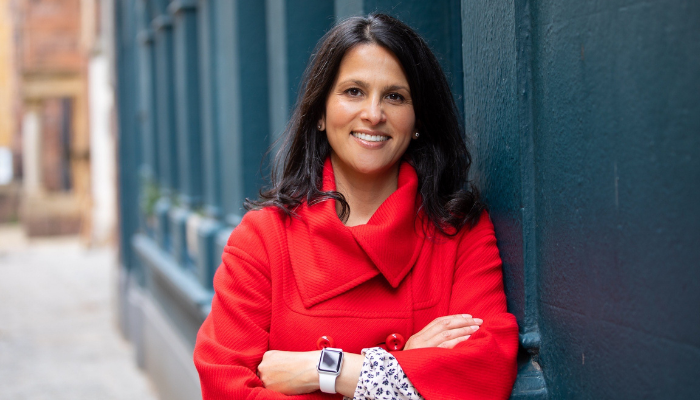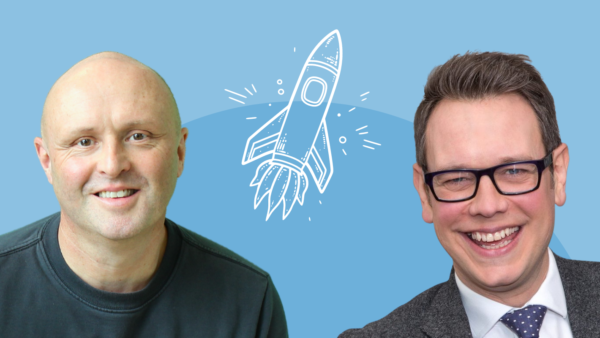Hi, my name’s Dr Paul Brewerton, the strengths guy, Doctor of Organisational Psychology and founder and Chair of Strengthscope. Today’s podcast relates to a topic that is not talked about enough, not understood well enough and, as a result, is not provided for by organisations well enough at this point. But that’s all about to change. I am delighted to welcome to the podcast today someone who is at the forefront of thought leadership and practice in the area of menopause – menopause at work and menopause coaching – Amantha King. Hi Amantha.
Now this is a really important listen for anyone who is working alongside anyone who is experiencing symptoms of menopause – pre, post, or during the menopause itself. And that will be many many line managers, it will be people professionals working in organisations and people professionals and business leaders who set the policies around menopause care in their organisations. So today’s conversation is super relevant for a whole load of people, including of course those people listening who are directly affected by menopause in some way.
Before we get any further, I feel I should ask you Amantha to define the menopause for us, as a start point to demystifying and giving clarity to everyone listening. How would you define menopause and the stages around it?
Thank you. Let’s get into our conversation now, I’m going to be asking Amantha about her personal journey and how she arrived where she is today. We’re going to talk about Amantha’s work on menopause and menopause coaching and we’re going to talk about how organisations can practically up their game to get better at providing for people affected by menopause. So let’s go.
- Amantha, can I start by asking about your career journey so far. How did you get here? From like when you were born till now? As summary or as long form as you like.
I absolutely love this type of question because it really does get you to revisit and consider the key steps that brought you to your now.
If we go right back to the beginning, my story starts in Watford, the middle child of 3 girls, Growing up in multicultural Britain. It was an interesting time being part of a mixed-race family and all the complexities that that brought in the 1970s. It wasn’t always easy but it was always interesting being part of family that had such diverse heritage. My mum is from Sri Lanka and My dad is from Ireland so to have this fabulous culture unison has really made me interested in people.. I think that’s where my fascination with people first started, experiencing the wonderful differences and common elements between these two groups of people. Our house was always busy – my parents friends were always calling in and there was a never-ending stream of parties. I feel I learned that observing people could be a full-time hobby in itself. As a middle child, with all the stereotypical complexities of not being the eldest or the youngest, I knew I had to create ways to get the attention of my parents. I Found the easiest way to get attention was to make people laugh and I really have such fond memories of putting on shows, impersonating famous people and just doing whatever I to make other people smile or laugh.
My happiest time was going to secondary school – I went to Watford Girls Grammar School and loved the camaraderie of that time. Because I stayed on for sixth form I really established some great friendships – some of which are still with me today. School gave me the structure I craved, I didn’t realise it at the time, but it also gave me the passion for biology that has stayed with me ever since. I wasn’t very focussed in my schoolwork – too busy making people laugh. My closest friend Tracey was so academic and I think she unknowingly imprinted on me in later life, the value of working hard. I just didn’t settle at school – I was fidgety and didn’t really knuckle down. I did ok and left school with a credible number of GCSE’;s and A Levels. I’m an ‘away from’ person – I’m motivated to keep safe and avoid discomfort which is why I went to University. I didn’t go for the academic experience, not as the primary reason – I was getting increasingly frustrated being couped up in a small house terraced house with 3 other very hormonal women (my mum and two sisters). Again, I only know now through my NLP work that I was actually chasing after a value I cherish – my freedom. I can distinctly remember sitting in cafe opposite the library in Watford. I was with my friend Tracy and a couple of girls who had already gone off to university. I like this story because it just shows how fate and reality are already predetermined for you to a large extent. We think we’re in charge and so in control of what we’re doing and that really isn’t the case. I was filling out my you UCAS forms for university and I just remember drawing a blank about my 5th choices. so I just remembered asking a friend where she was studying and popped Nottingham Trent University down. I had my heart set on going to Kings College in London but the reality was I hadn’t actually worked hard enough and my A level results fell short. You might think that this was terrible but actually for me this was the beginning of the rest of my life. I can remember feeling really disappointed that I hadn’t got the results I wanted and so I applied to a summer college to retake my A levels. I honestly believe this was my first encounter with a living Angel. The day I went to see the College in London I can remember thinking okay this is going to be part of the big plan but little did I know there was a much bigger plan in store for me. I remember the principle of the college being very kind and compassionate and really interested in me as a person. She quickly concluded that retaking my A levels was probably a mistake and that I should actually consider going one of the universities that had given me a lower offer and to embrace the prospect of studying something that really fulfilled me. I just remember feeling terrified, this wasn’t how the day was meant to pan out and my meeting with the principal ended by her suggesting she would ring my dad to talk through this new option. For some reason I went along with her suggestion and although feeling sick waiting for the phone to ring in our house somewhere I must have known it was the right thing to do. I can really just remember the one-sided conversation of my dad’s voice he just kept repeating the word ‘I see’, or ‘OK’ and when he got off the phone he just asked me directly so you want to go to university do you? and I instantly said yes!
Now this story might not sound that amazing, until you know that because I said yes!, I went on to meet my future husband who I’ve been with for the last 30 years and have my beautiful daughter with! I got my everything in saying that one Yes!
I honestly believe that the moment I was being guided towards was that ‘yes’ and when I look at my strengths – courage is one that I know I’ve had in abundance throughout my life.
When I left university I was pretty sure I knew that I wanted to use biology in some capacity. I knew I didn’t want to work in a laboratory or office – I’m not built for that. I need to be able to have variety, be free to move around and I just wither in the environment that stays the same. I also know I didn’t want to go into further academic education.
So like most students I went along two careers fairs and scanned the prospects newspaper each week. I saw an advert for a clinical research associate job which involves helping to plan and organise clinical trials. Again, a chance conversation during an interview, got me to think about my other options. The lady who interviewed me suggested I might be better trying a medical representative role in a pharmaceutical company as she believed this would give me a good grounding to become a clinical research associate. I took her advice and applied to a French pharmaceutical company a month after graduating – I got my first paid job.
I absolutely loved my time in the Pharmaceutical industry – I spent 12 years in the same organisations – navigating my way up the corporate career ladder selling cardiovascular drugs, Diabetes Medication and HRT (Hormone replacement Therapy). I wasn’t a natural salesperson and 3 months into the role – I was in danger of not completing my probationary period – because I hasn’t sold very much. I hadn’t made the connection that talking wasn’t selling. I remember having a pretty awful conversation with 3 senior managers all of which agreed I had potential – but potential doesn’t pay the bills. Through my tears and upset I didn’t realise that this was another turning point for me. Instead of going home that day – as suggested by the managers – I went back out into my territory and made a commitment to myself that if I was going to leave this job – it would be on my terms – not theirs. I just grew inside and started ‘closing’ the business in calls. I drew on my childhood qualities of ‘being genuinely interested’ in people and the magic started to happen. Sales led to awards and awards lead to promotion.
But likes most things, we have neurological rule-based systems for keeping us happy and fulfilled and I’d started to notice that I didn’t feel like I was enjoying the role of being a manager anymore. I needed to feel stimulated and have my values met to stay engaged with things in my life. Work buoyed me along for a bit because I had the privilege to qualify as an NLP practitioner which work paid for – it bought me time and it helped me take my team to success before I reconciled that it was time to leave. It made me even more curious about how you can manifest success and become really consistent with that. I wanted to make a real difference to people on a daily basis – rather than waiting for the sales to drop in against ever increasing targets– I wanted to get something even more tangible – success for other people.
On reflection I think my frustrations at work were also a signpost for something much bigger than I’d anticipated – wanting to have a baby! I wasn’t THAT person – baby’s weren’t ever a consideration for me – because somewhere in my psyche I had an overwhelming fear of dying in childbirth. So strong was this fear that I remember saying to my husband – if you want children – it can’t happen with me! Around the time I was reconsidering my options at work – I had the chance to work with an amazing coach who also worked with horses to help impart coaching learnings. Andrew Macfarlane absolutely changed my life – by being real with me during a coaching conversation, by asking some really clear questions I could see it was time to leave. I remember he asked me what you think you want to do – and I replied. “I’d quit like to do your job, being a coach”. I had spent 80% of my current role doing that anyway – but I liked the idea of starting something new. Little did I know, I was actually already pregnant at that stage.
I needed to go and get the fear thing sorted out, so went to a lady called Bronwyn – who did NLP – but it was very different to how I’d experienced on my course. She used Timeline therapy to remove my fear and although I had a terrible delivery on the night my daughter was born – I was remarkably calm given the seriousness of this situation.
All this just made me want to know even more about NLP and ways that I could use it to help people ‘be their best’ – which is how describe what I deliver for people. The urge to step away finally came and within 2 years I was already turning the spark of Amantha King coaching into a reality. In 2010 – I started my business, aged 39 and already perimenopausal by this stage.
My daughter was only 5 and I was in the turbulence of the hormonal storm whilst starting a business – it was the best and worst times all at once. Peaks of confidence interspersed with crushing doubt about my abilities as a mum and businesswoman. My motivation to create a business I could shape was due to the need to have freedom and the maximum control over how my work life balance would play out. I realised how important it was for me to feel in control – something that the perimenopause steals from you because you can feel very ‘out of control’.
Becoming a mum was and is the proudest achievement of my life – and it’s the gift that keeps on giving. Nothing is more important than that part of my identity and I managed to shape my business to reflect that by not working evenings, weekends or the school holidays – because I wanted to be fully present AND have my business.
As my business progressed I was privileged to spend a lot of time in the company of amazing executives – some women and some men – but what each conversation had in common was wellbeing and the impact of stress in their lives. It was this focus in coaching sessions which started to shine a light on the experiences I was also having personally – the intruder in my life – perimenopause was creating a lot of stress for me. I would have clients disclose to me the difficulties, confusion and upset that this experience brought into their lives as either the person experiencing the hormone disruption directly or as the person supporting someone else with hormone issues. Hot flushes weren’t just affecting one person’s sleep – it was affecting two. These conversations covering ‘hormones’ were taking place regularly from about 2015 and it was in 2019 that I decided to start making plans for creating the menopause arm of my business – My Menopause Coach. It gave me a renewed purpose, to help people who experience the roller coaster of female hormones or who are supporting people during this transitional time. Turning 50 last year seemed like a fitting time to officially start a new chapter in my life. I’m currently co-authoring a book about mental health in the workplace and menopause is a big chapter as you can imagine. I really feel it’s just the beginning another amazing chapter in my life that I’m hugely excited about.
- Tell me about menopause coaching – what is it and why is it important?
Menopause coaching is unregulated right now, so my ‘interpretation’ of the role is unique to my offering. My focus is about supporting a woman or person with female hormones through the natural stages of menopause transition from the early stage of perimenopause to menopause and finally post menopause. It’s about educating each client to understand what their menopause experience could be like and to use information to help them prepare for their unique experience. It is well documented that women who go into menopause with knowledge and confidence tend to have a more positive experience. It also helps them be more resourceful and able to access the care and supports they need because they have an ally. Menopause coaches cannot prescribe, they can only offer support. Having promoted HRT in the past in the NHS and having had a lived experience is another plus point that I bring as a menopause coach – because I can empathise and understand the complex nature that each menopause history can have. You can ask the right questions to clients based on that knowledge pool you have and you can create confidence and reassurance for your client. As a menopausal woman myself I am very aware that menopause is a bio-psycho-social experience and sadly for many women this time can really exacerbate challenges that they are already experiencing. Many women find their relationships can become more complex, family dynamics change and they feel hijacked and at the mercy of their hormones. Using my NLP skills during the coaching helps women to feel more confident about themselves and regain their personal strengths and purpose in life. My clients have found that this blend of coaching really helps them to be more confident and on with the rest of their lives because they have the biological and psychological knowledge to support themselves.
Knowing what supports and resources to offer each woman is essential so that I can assist clients to have the best experience they can. Menopause can be an incredibly positive time for women and is largely affected by how confident the person is as they embark on this process. The menopause is treated very differently in cultures around the world and In some it signals the highest respect for women and for others it can pass without commentary. What we do know is that women have so much to offer and with life expectancies exceeding 83 years of age by 2025 – we can and must assist women to have fulfilling 3rd ages to their lives.
- Can you give me any examples of work that you’ve done and the outcomes that you’ve had (I appreciate that this may be sensitive/confidential and so you may not want to talk about specific cases or examples, it’s just that stories will really bring it to life)
Kate 49 –lost her executive job, was experiencing financial problems, lost house and had difficulty in her relationships. Lost confidence and hadn’t been able to get HRT from GP. Sleep issues were the biggest concern. The approach was to listen to her experience and to decrease her stress levels as this was making her hormone levels fluctuate erratically. Kate was coached to understand what menopause is and isn’t and she was given guidance to take to her GP which resulted in her getting her HRT. She reported she had the best nights sleep in 5 years and was now in a new house and was considering going from part time to full time work.
Pauline 52 – A Teacher who has become increasingly anxious and struggling to speak at work and in public settings as she has lost her confidence. Taking a full history is essential as it can throw up other factors which are increasing an individual’s stress levels. It also can shine a light on where the gaps are in their own wellbeing strategies. Pauline’s family history was really helpful in finding out that she has oestrogen dominance – a condition which first showed itself during her adolescent years as endometriosis. Menopause is often exacerbated by conditions such as this or PMS (Pre-Menstrual Syndrome), PMDD (Pre Menstrual Dysmorphic Disorder), PCOS (Polycystic Ovary Syndrome) and knowing what to look for is key.
On a larger scale I’m working with large organisations to help create menopause friendly cultures through awareness and coaching for staff. Every journey starts with a single step and as long as businesses are taking those steps collaboratively with their employees, they are contributing to the wellbeing and positivity in their organisation. This is not just a tick box it’s an integral part of Equality, Diversity and Inclusion.
- What do organisations need to change in the way that they manage menopause at work? What positive changes or examples have you seen since you’ve been doing this work? And what about examples of poor practice?
Menopause is undoubtedly an elephant in the room with regards to HR issues. Menopause is an issue for so many women but almost never directly addressed by employers. This is absurd when we consider that there are 4.5 million women aged 50-64 in work in the UK and it is the fastest growing demographic – meaning there are few workplaces that WON’T have staff experiencing menopause in some shape or form. When I work with organisations we start by looking at the extent to which perimenopause and menopause could be experienced in the business and if you consider the NHS is 77% female – a conservative estimate is that in a large business this could rage from 25-45% of their workforce if you factor in perimenopausal and menopausal women within the age range 40-59. This is a key retention and recruitment issue – women are often at the peak of their skills and experience and we should be getting the most from this talent pool. We know that 1 million women have left the workplace due to menopausal symptoms. There just isn’t enough money in the economic pot to ensure these women have enough in their pension funds to see them into older age.
The biggest change that needs to take place is for businesses to really appreciate that this is not going away. The estimated cost to a business of losing a female employee due to menopause is approx. £30,000. This is a significant loss of productivity. With women taking on average 32 weeks over their entire career to manage menstrual and women’s health issues- we’re not supporting these employees anywhere near adequately. Every year we’re losing 14 million workdays to menopause. This creates further health inequalities and creates further stresses on women which could result in employment tribunals. There has been a significant rise in employment tribunals that involve the treatment of workers going through the menopause. According to data from Menopause Experts Group the trend for tribunals is increasing:
2018 had 5
2019 had 6
2020 had 16
2021 had 10 cases in the first half of the year and projected total of 20 by the end.
An employee who feels they have been treated poorly as a result of menopause could potentially have claims for constructive dismissal and sex discrimination (Equality act 2010 and The health and safety Act 1974))
These ET’s can largely be avoided if by going back to basics and making sure education and communication are a priority. Women should feel free and able to discuss menopause issues in an open, honest and healthy way whilst feeling like they can and will be supported by their employers.
I’m currently working with the organisation MenopauseX which is an initiative between key leaders in data, technology and menopause care and education. The aim is to materially improve the wellbeing of individuals – of all identities and intersectionality’s and their loved ones through data insights and recommendations – this hasn’t been done before.
- What about line managers specifically (if not covered), any guidance or advice for them?
It’s a really interesting aspect of menopause when we think about the people who are supporting these women. Many might assume that women mangers would be more empathetic towards other women – but this isn’t necessarily the case. Some women in management will have a relatively symptom free experience of menopause and so they don’t relate to their colleagues. Other women may actually feel fearful of the stigma and judgments associated with the menopause and the idea that they could be discriminated against – many women won’t acknowledge or talk about it themselves because they fear it could limit their career and promotional opportunities. Men are fearful too – about saying the wrong thing, not understanding the relevance of menopause to business and not knowing how to start a conversation relating to menopause. The most important thing in any employee conversation is to help them feel comfortable to have the chat, to feel like they’ve been listened to and to feel like they have your support. This really is no different to having any other employee wellbeing conversation e.g. Like pregnancy. Most people would know confidently how to have a conversation with a pregnant member of their team, they’d know the policy guidance and the rights of the individual. It certainly wouldn’t be a them and us type approach.
The role of line managers in supporting employees experiencing menopause is crucial. Line managers are usually the first point of contact when an employee wants to disclose any issues they may be experiencing coma however nine out of 10 women say they feel unable to talk to their managers about menopause. Managers need to be trained to:
- hold regular check-ins with employees that focus on wellbeing as well as performance
- confidently have conversations
- not make assumptions or judgments
- build good working relationships
- understand menopause and how it can affect employees at work
- spot changes in behavioural performance
- know which support and possible adjustments could be appropriate
- Be ready to signpost to internal and external support
- carefully document absence due to menopause and Women’s Health issues
- remember the power of asking twice -if you ask someone how they are twice you may get a different response on the second attempt because you are signalling you are not asking out of politeness or as a conversation starter, but because you care.
- And top tips for women experiencing menopause as regards support, help, dealing with work-related challenges, i.e. if your employer/boss is unsupportive?
The most powerful resources available to a woman going through the menopause transition are knowledge and communication. The conversation can be available in many forms: from a consultation with your GP or someone in the practice with menopause interest. This is the best starting point to get help. If you have an EAP at work– it is definitely worth exploring what menopause supports are available there or via your occupational health team at work.
At work, there is no substitute for a supportive one to one conversation with your line manager if you feel comfortable. This is the place where the most help can be offered to you in work. But, If you don’t feel you can explore that, then there are many group supports and forums through social media which have menopause champions and advocates. If we remember that many women will be reluctant to express their concerns about their menopause symptoms in work because the subject matter is too personal or they feel their symptoms are too embarrassing for them, or the person they don’t feel comfortable talking to their line manager because they may be younger or unsympathetic, it is easy to see why women worry that their symptoms will not be taken seriously. The fear that the information disclosed would not be kept confidential or that they will be seen as less capable and therefore negatively affect their career progression. All of this is due to the stigma surrounding menopause in the workplace. So Women need to find a credible resource that can help them connect the dots in their situation so they are better placed to have those meaningful conversations with their manager or employer. I really like that there is a real presence around menopause care with the creation of the new Menopause Society attached to Newson Health, the availability of apps to monitor your menopause symptoms such as Balance App which also provides an active community for menopausal women and their partners. It is vital that we adopt an ‘in it together’ approach to menopause and women health generally. I feel that there is a growing change in what women can use to help themselves and I wish I’d had access to them 10 years ago. There are meditation Apps such as Calm and Headspace. Evia is an app that is available to help manage hot flushes through meditation. There are apps that help you cultivate healthier sleep patterns like Bhuddify App, Better Sleep App. There’s also a growing interest in information around exercise and nutrition so that women can really connect their own dots during menopause.
The companies that are doing really well are the ones that have already created the right culture and are successfully enabling women to stay in work – tis is a measure of cultural success in business. The biggest challenge is for business to remove the stigma and the best place to start is by making the conversation public in their business. Getting employees to share their experiences at all levels. Challenging unwanted or inappropriate comments and banter around menopause. Embedding the key messages around menopause through guidance documents and policy.
- I understand that you’re in the process of setting up a men’s menopause group, tell me about that – why you’re doing it, what you’ve found out so far and how it’s going.
So the reason I’m setting up men’s menopause group came about as a result of some posts I’d put out on LinkedIn. It was really fascinating to see the number of people who were interacting with the posts but also to see the number of people who weren’t ‘liking’ or ‘commenting’ but were viewing the posts. It made me curious about trying to understand the messaging around menopause for men and women and whether it needs to be different in its style and the way it’s put across. Having qualified as mental health first aider, I have that awareness that traditionally men have found it difficult to talk about how they feel, about their own mental health and wellbeing. And it got me thinking why menopause would suddenly become a topic that they would want to talk about. Men are already struggling to talk about their own male health issues let alone women’s health issues. I really lucky because my husband has been incredibly supportive throughout the entire time we’ve been together and that’s amounting to 30 years this year. So when I look at our relationship he is the one person who has supported me through all my hormonal ups and downs in my 20’s through to me being 50 last year. I notice that when I started putting videos on YouTube in my series called ‘Menopause Conversations’, that many of my husband’s friends and work colleagues were reaching out to him to sound him out about menopause. It made me realise that need to talk and know more about menopause and then it needs to be presented in a way that is something that men can relate to. I have managed to get a small group of men who are willing to learn more about menopause. The reasons why they are signing up are very varied. Some men are there to support their wives who are currently going through the menopause, others are there wanting to prepare for when their partner does go through the perimenopause. One of the common themes that has been expressed to me from men, is that they actually feel a huge sense of loyalty to their partner and are fearful of the stigma attached with talking about menopause in work !. So that’s a really interesting point isn’t it, men are actually fearful of disclosing that their partner is actually struggling with the menopause transition. What I notice and think is really important here is that for every statistic we may give around menopause symptoms for women, if you are a partner supporting that woman, you will also be experiencing the consequences of those symptoms and that might be sleepless nights, it might be having to do more responsibilities at home, it could be but you’re not on top of your game when it comes to work. So that’s why I say the solutions around menopause actually lie with men and women. I believe it’s important to keep this group going because it could provide a template for setting up groups within organisations. I feel we need to be realistic with our expectations around getting men on board if we are to have them fully engage with what we are trying to achieve – parity for Women. To get to a place where menopause is positive for women we need to accept its definitely not a sprint but maybe not a quite the full marathon. Having the topic of menopause in the public domain is a huge leap forward in what we are trying to achieve and I for one am delighted and privileged to be in the menopause space as an advocate who champions solutions.
- Last question – if you met you as younger you with the knowledge and experience you have today, what advice would you give you?
I love questions like this! I actually get quite emotional at times when I consider it. Because, like most people, you don’t realise how far you’ve come until you stop and look over your shoulder. Its easy to just focus on what you didn’t do or what didn’t work out so well. I’m a huge fan of Eckhart Tolle and the Power of Now and I guess my advice to my younger self would be wrapped up in the mantra of ‘it will all work out’ let the future come and let the past go. By Letting go of the fear and worry, just know that you have strength in abundance and you will always be ok. My tendency is to be an away from person – I like security and control in my life. I maybe relied too much on that and didn’t always enjoy the journey to the metaphorical destination. Nowadays I’m much more likely to say ‘yes’ if it fits in with my values and I’m even more confident to say no if it doesn’t. I would look my younger self in the eye and let her know that she is good energy in the world and she can afford to use it to do good. I passionately believe we all have it inside of us to do good in the world – if we just believed in ourselves and others a bit more every day. My parting advice would be to do whatever it takes to turn up each day and be your best – not anyone else’s version of ‘best’ or even being THE best. Just be intentional about being your best in all areas of your life and share your good fortune with others.
- Last last question – if people want to get in touch with you or follow you on social, how can they find you?
I’m really active on social media and would say to connect with via any of the links on the episode notes
Email – amanthakingcoaching@gmail.com
LinkedIn – https://www.linkedin.com/in/amantha-king-14966515
Twitter – https://twitter.com/AmanthaKing
Instagram – https://www.instagram.com/amanthakingcoaching/
Instagram – https://www.instagram.com/mymenocoach/
Youtube – https://www.youtube.com/channel/UCiRCV_FQ1CUCtSiqr9dD6xg
Thank you so much Amantha, it’s been an amazing conversation, thought-provoking, informative, life-affirming. Thank you. If you want to hear more from Amantha, check out the shownotes on the Resources page of the Strengthscope website, for her contact details and recommended resources. Till next time, stay strong!












